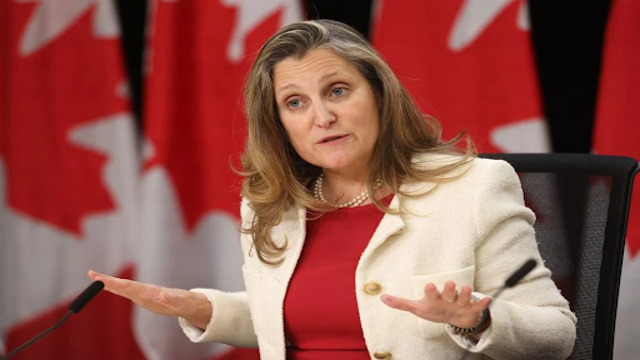
Federal Finance Minister and Deputy Prime Minister Chrystia Freeland spoke at a press conference in Ottawa on November 19, 2024. (Photo credit: Patrick Doyle, The Canadian Press)
The Liberals’ recent fiscal update, which aimed to boost business investment and strengthen border security amid Donald Trump’s impending return to the White House, took an unexpected turn as Finance Minister Chrystia Freeland announced her resignation hours before the update’s release.
Freeland’s departure, made public on Monday via a post on X, sent shockwaves through Canadian politics. In her resignation letter, Freeland revealed that Prime Minister Justin Trudeau informed her last Friday of his plans to remove her from the finance portfolio and reassign her to another cabinet role. Freeland stated that stepping down was the only "honest and viable path," signalling deep disagreements with Trudeau over Canada’s financial strategy in the face of potential U.S. tariffs.
Freeland, who played a key role in crafting the fiscal update, did not present the document or deliver her planned speech in Parliament. Her prepared remarks were omitted from the materials shared with reporters, leaving the spotlight on the ensuing political uncertainty.
The fiscal update unveiled a deficit of $61.9 billion for the 2023-24 fiscal year, significantly higher than anticipated. The increased deficit is attributed to costs related to Indigenous legal claims and pandemic-era benefits and loans that remain unrecovered. While the deficit is expected to shrink to $48.3 billion in the current fiscal year, questions loom over the government’s financial management.
Among the key measures in the update is the reinstatement of a temporary capital cost allowance, allowing businesses to claim larger tax deductions for capital expenses upfront. The move is designed to spur business investment in response to Trump’s promise of tax cuts in the U.S., but it will cost Canada $17.4 billion over six years.
The update also allocates $1.3 billion to bolster border surveillance, addressing Trump’s threats to impose a 25% tariff on goods from Canada and Mexico unless both nations curb migrant and illegal drug flows into the U.S.
Despite these measures, Freeland’s resignation overshadowed the fiscal update, sparking calls for Trudeau’s resignation from Liberal MPs and NDP Leader Jagmeet Singh. This political turbulence raises the possibility of an early election, further compounding economic uncertainty.
Freeland’s letter highlighted her concerns about Canada’s readiness for a potential tariff war with the U.S., urging fiscal prudence over "costly political gimmicks." Her departure underscores mounting tensions within the Liberal government.
As Public Safety Minister Dominic LeBlanc was sworn in as the new finance minister on Monday, the Trudeau government faces the dual challenges of addressing domestic political instability and navigating uncertainties tied to Trump’s return.
Economists warn that the combined effect of Freeland’s resignation and Trump’s policies could have far-reaching impacts on Canada’s economy. Mostafa Askari, a chief economist, cautioned that the political uncertainty could significantly disrupt Canada’s fiscal stability.















